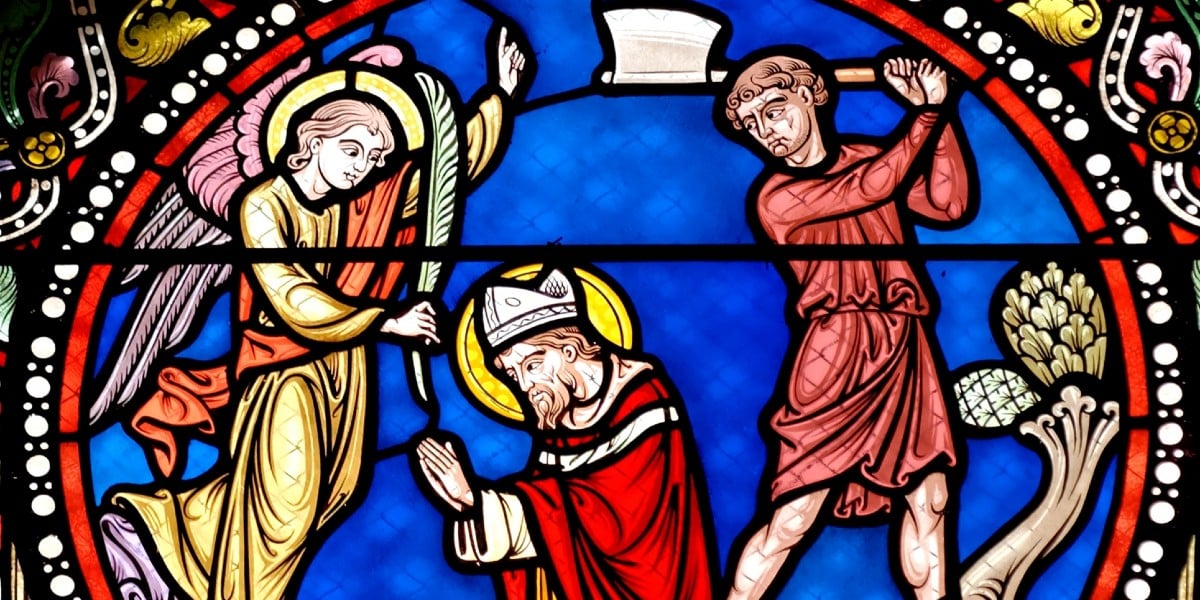Regina Caeli – Queen of Heaven, Rejoice!
The Regina Caeli, Latin for “Queen of Heaven,” is a hymn and prayer ...

The selection from Origen’s Exhortation to Martyrdom is read on the feast of martyrs Saints Marcellinus and Peter on June 2. Marcellinus, a Roman priest, and Peter, an exorcist, were martyred together in Rome during the persecution of Diocletian around 303 AD. They evidently faced death with such nobility and courage that they converted their executioner to the faith. This man later told their story to a young boy named Damasus who eventually became Pope. The Roman Church has honored their memory for centuries by including their names in the Roman Canon (Eucharistic Prayer I). Origen, the author of this reading, at the young age of 16 saw his own father dragged away to martyrdom. Several decades later, Origen himself joined the ranks of the Confessors by suffering imprisonment and torture for his Christian faith.
If passing from unbelief to faith means that we have passed from death to life, we should not be surprised to find that the world hates us. Anyone who has not passed from death to life is incapable of loving those who have departed from death’s dark swelling place to enter a dwelling made of living stones and filled with the light of life. Jesus laid down his life for us; so we too should lay down our lives, I will not say for him, but for ourselves and also, surely, for those who will be helped by the example of our martyrdom.
Now is the time for Christians to rejoice, since Scripture says that we should rejoice in our sufferings, knowing that suffering trains us to endure with patience, patient endurance makes us pleasing to God, and being pleasing to God gives us ground for a hope that will not be disappointed. Only let the love of God be poured forth in our hearts through the Holy Spirit. [Romans 5:5]
The more we share in the sufferings of Christ, the more we share, through them, in his consolation. We should be extremely eager to share in Christ’s sufferings and to let them be multiplied in us if we desire the superabundant consolation that will be given to those who mourn. This consolation will not perhaps be the same for all, for if it were, Scripture would not say: The more we share in the sufferings of Christ, the more we share in his consolation. Sharing in his consolation will be proportionate to our sharing in his suffering. We learn this from one who could say with all confidence: We know that as you share in the sufferings, so you will share in the consolation as well.
God says through the prophet: At an acceptable time I heard you; on the day of salvation I helped you. What time could be more acceptable than when, for our fidelity to God in Christ, we are made a public spectacle and led away under guard, not defeated but triumphant?
In Christ and with Christ the martyrs disarm the principalities and powers and share in his triumph over them, for their share in Christ’s sufferings makes them sharers also in the mighty deeds those sufferings accomplished. What could more appropriately be called the day of salvation than the day of such a glorious departure from this world? But I entreat you not to give offense to anyone, so that our ministry may not be blamed. Be very patient and show in every way that you are servants of God. Say: And now, what do I wait for? Is it not the Lord?
Banner/featured image Scenes from the life of Saint Austremonius: his martyrdom. Photo by Jastrow. Public domain.
The selection from Origen’s Exhortation to Martyrdom (Nn. 41-42: PG 618-619) by is used in the Roman Office of readings for the feast of the martyrs Marcellinus and Peter on June 2. Marcellinus, a Roman priest, and Peter, an exorcist, were martyred together in Rome during the persecution of Diocletian around 303 AD. They evidently faced death with such nobility and courage that they converted their executioner to the faith. This man later told their story to a young boy named Damasus who eventually became Pope. The Roman Church has honored their memory for centuries by including their names in the Roman Canon (Eucharistic Prayer I). Origen, the author of this reading, at the young age of 16 saw his own father dragged away to martyrdom. Several decades later, Origen himself joined the ranks of the Confessors by suffering imprisonment and torture for his Christian faith.
No Comments